Seizing the day, saving a life is all in a day’s work for Tata Memorial Centre’s specialised patient navigation professionals. mid-day shadows these life-saviour ninjas as they navigate death, crisis and despair with incomparable gift

Snehal Mungekar, Apoorva Tiloda and Neha Desai, Kevats at Parel’s Tata Memorial Hospital battle minute-by-minute challenges in the OPD as they help struggling patients cut through paperwork, comprehend diagnosis and accept treatment. Pic/Shadab Khan
At 10 am, the doors of the outpatient department (OPD) of the Tata Memorial Hospital, Parel, swing open. A sea of people wait for their turn to get in but there is no scramble. Some of them are fitted with nasal tubes, others carry unseen battle scars. Some of the patients head to the enquiry counter while others head straight to the men and women in royal green coats.
ADVERTISEMENT
Apoorva Tiloda, one of the young men being sought out by the patients, is a Kevat. Like the 19 others on the team, he is on his feet for eight to 10 hours straight with not a minute’s of peace. Steadily, patient after patient approaches him with files bulging with printouts of medical reports.
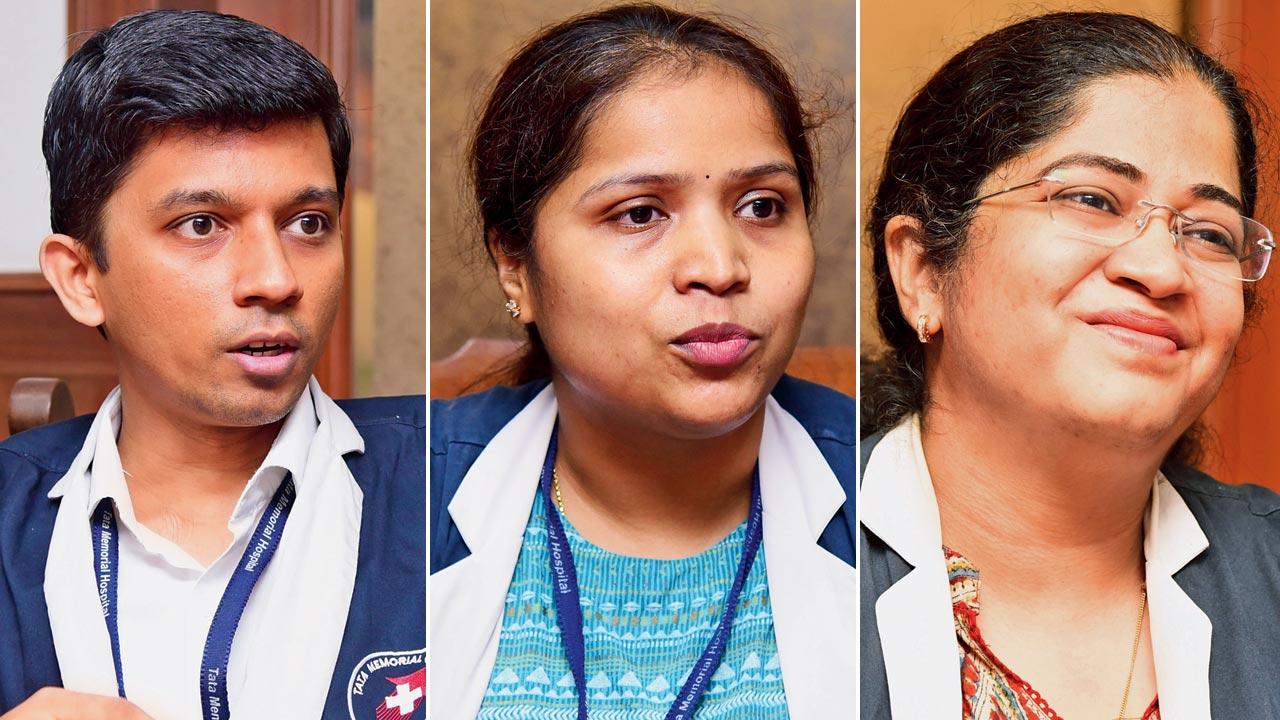 Apoorva Tiloda, Snehal Mungekar and Neha Desai
Apoorva Tiloda, Snehal Mungekar and Neha Desai
Tiloda is a 2019 graduate of the Kevat training programme that TMH runs in association with the Tata Institute of Social Sciences (TISS) since 2018. His background in pharmacy and passion for “service” found a ready match in this one-year diploma paramedical course in patient navigation in oncology. An alumnus of the first batch of graduates, Tiloda is a sort of veteran. His batchmates and those who came after him have helped changes in assistance so dramatically that the Tata Memorial Centre (TMC) announced last week that it will launch a one-year certificate Kevat course across all its nine hubs/hospitals in various Indian states, including ACTREC (Advanced Centre for Treatment, Research and Education in Cancer), TMC’s state-of-the-art R&D wing in Kharghar, Navi Mumbai. For its Parel hub, the most sought-after, it has launched an additional two-year MSc course that is even more thorough, via specialisations like community navigation, breast oncology or palliative care along with a dissertation in it’s curriculum.
This year will see another first. The programme is all set to see its first international diploma-holders graduate. On May 2, 37 Indonesian Kevats will participate in a convocation ceremony, making this initiative one of India’s first homegrown ealthcare management programmes to see an international collaboration.
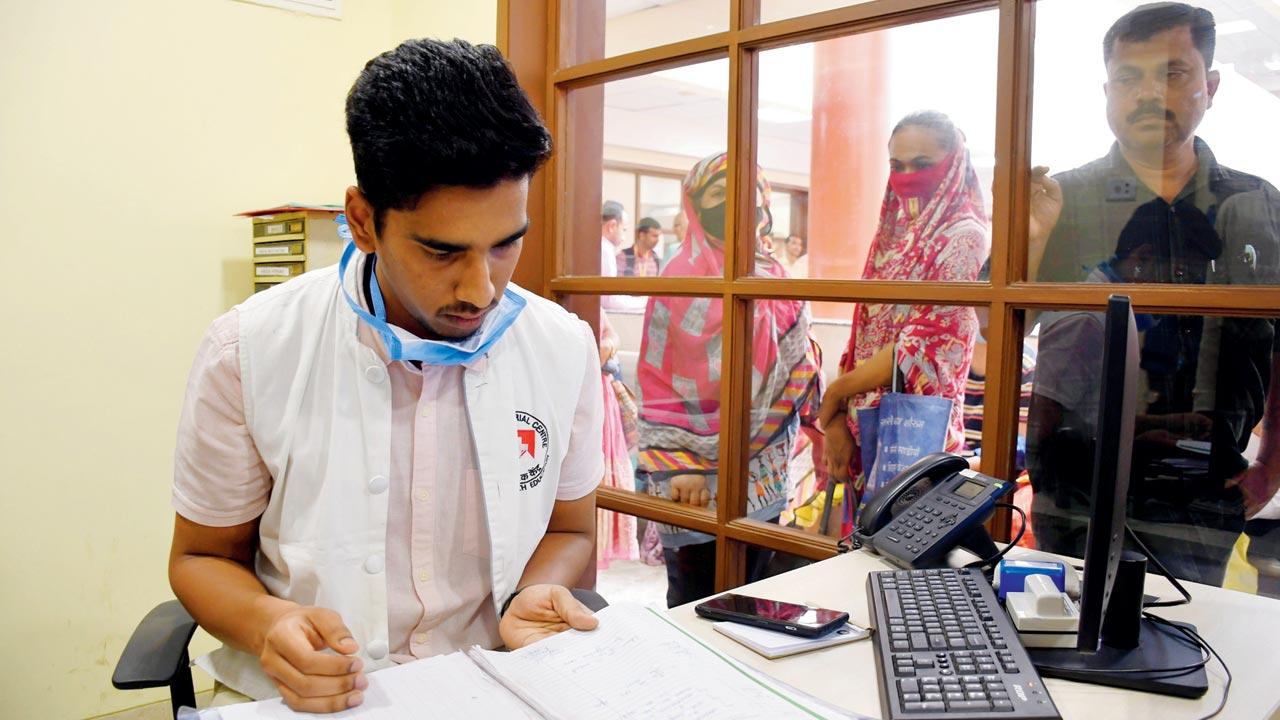 Siddhant Shilwan, a Kevat assistant at ACTREC Kharghar scans documents as patients eagerly await their turn. Shilwan says he applied for the programme last year after experiencing the life of a caregiver when his father was ailing. Pics/Kirti Surve Parade
Siddhant Shilwan, a Kevat assistant at ACTREC Kharghar scans documents as patients eagerly await their turn. Shilwan says he applied for the programme last year after experiencing the life of a caregiver when his father was ailing. Pics/Kirti Surve Parade
The decision to expand the course comes after TMH’s Parel headquarters saw a 44.4 per cent drop in the time taken for a patient to receive the first line of treatment after entering the premises.
Dr Vinit Samat, medical superintendent, TMH, believes that a combination of the one-year certificate programme and the two-year MSc course will create a new legion of Kevats who are able to deal with the growing number of cancer patients approaching the institution from across the country. TMH Parel receives 1.2 lakh patients annually according to latest estimates.
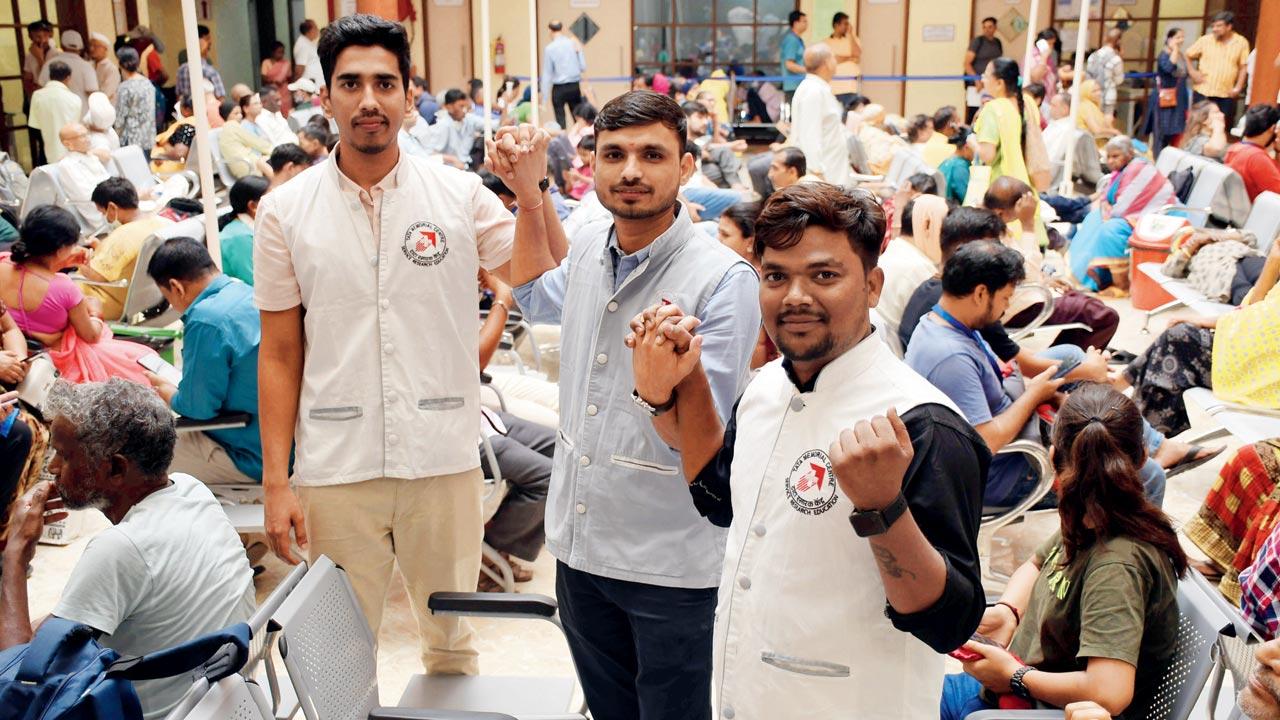 Siddhant Shilwan with his colleagues, Ganesh Patil and Dilip Jaiswar in the Actrec OPD. The three usually exchange notes on how to deal with challenging cases
Siddhant Shilwan with his colleagues, Ganesh Patil and Dilip Jaiswar in the Actrec OPD. The three usually exchange notes on how to deal with challenging cases
“We need more Kevats,” Samat tells mid-day, “The current number is insufficient to handle patient inflow. A few years down the line, the ratio will be terribly skewed.” In February 2024, the Indian Cancer Congress (ICC) announced that 14 lakh new cancer cases had registered nationally in the year 2019.
Despite the pressure, Tiloda whirs around the OPD, managing to break into a smile when his eyes catch a familiar face. A young girl in a wheelchair pushed by a man in his 40s goes past us; the girl musters a look of recognition. “She is 15, a patient of thyroid cancer,” Tiloda, who handles head and neck cancer patients, says. “When she was informed about the chemotherapy and radiation cycles, she asked me if anyone would marry her. She has developed extreme body dysmorphia as a result. We are counselling her through it.”
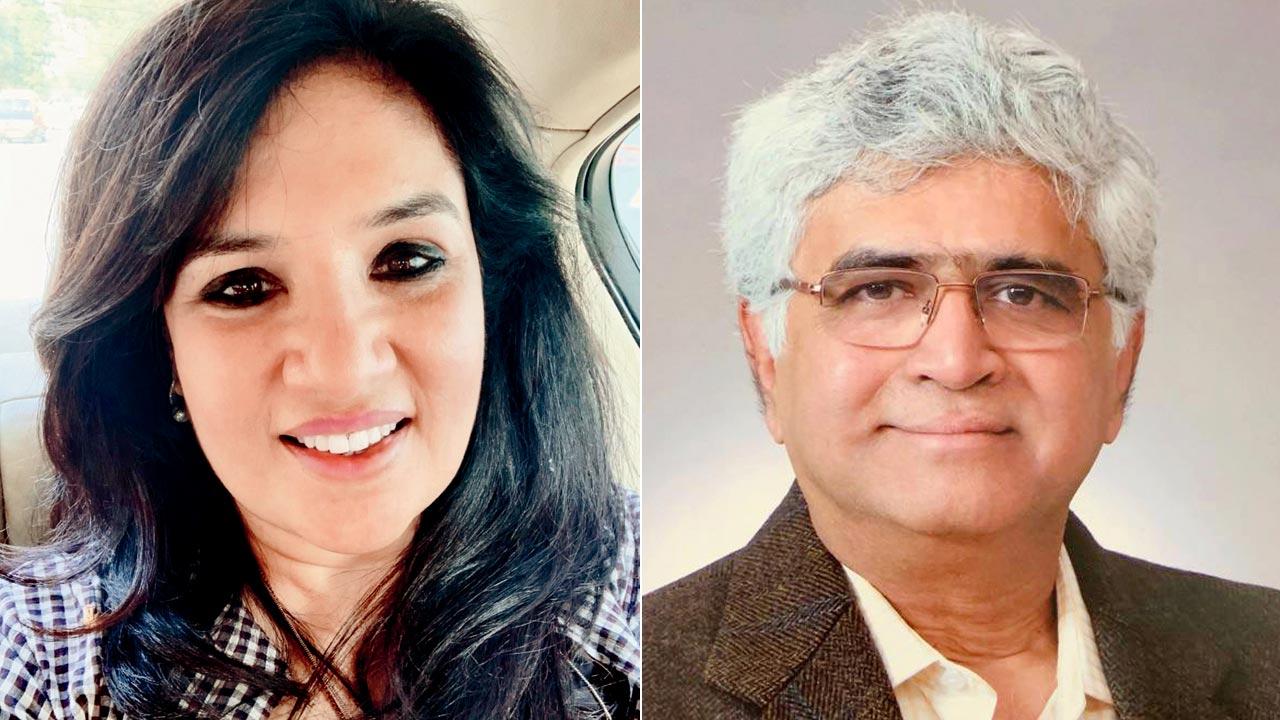 Nishu Singh Goel, Program Head, TMC-Kevat and Dr Rajendra Badwe, Professor Emeritus, Ex-Director, Tata Memorial Hospital
Nishu Singh Goel, Program Head, TMC-Kevat and Dr Rajendra Badwe, Professor Emeritus, Ex-Director, Tata Memorial Hospital
We haven’t spotted despair on his face in all these hours. Experience has hardened him. In the first week of his joining work in 2018, he came across an oral cancer patient who was exactly his age. “The doctor had informed them in detail about the diagnosis, surgery, chemo and radiotherapy. But it always takes time for the news to set in. He came out of the consultation and asked me, what excatly does this mean?”
Tiloda repeated the information with patience and calm. “I kept talking, even as he broke down. I didn’t stop. We wait for them to compose themselves but we must gently inform them of what the immediate future holds. He wept incessantly even as his wife and toddler stood next to him.”
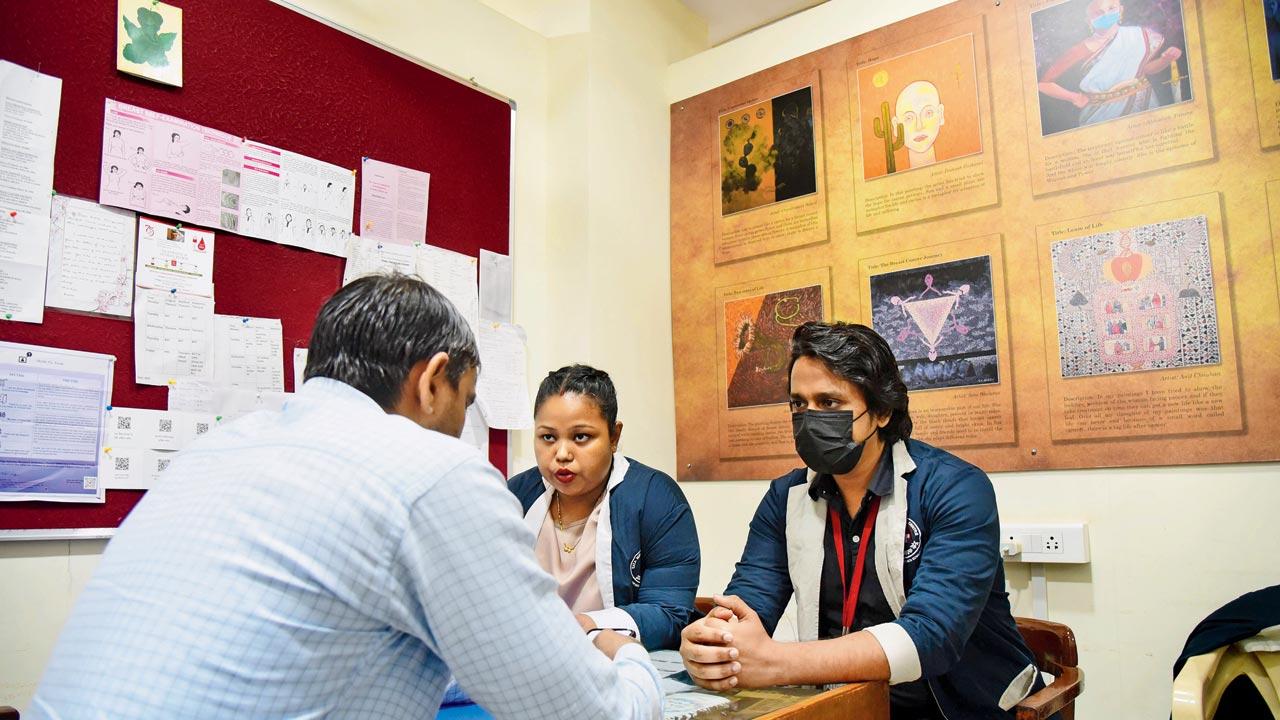 The counselling room is where the Kevats talk to patients pre-and- post consultation with the doctor or clinician. Most patients don’t comprehend the technicalities of the treatment or are too deep in shock to understand the way forward. Pics/Shadab Khan
The counselling room is where the Kevats talk to patients pre-and- post consultation with the doctor or clinician. Most patients don’t comprehend the technicalities of the treatment or are too deep in shock to understand the way forward. Pics/Shadab Khan
Tiloda allows us to accompany him to the counselling room in a corner of the OPD where patients receive pre-and-post consultation counselling. A queue stands outside waiting for Tiloda to arrive. His colleagues carry on checking documentation that’s mandatory for the pre-consult. The likes of Tiloda will scan the documents to make sure all is in place before a patient meets a clinician for the first time. One patient has brought along the biopsy report ,but not the sample. He looks distressed with the oversight. The team of Kevats consulted each other, checked where the biopsy was done and decided to make a call to the diagnostic centre.
Dr Neha Desai, who has a Bachelor of Dental Surgery, and graduated from the Kevat diploma programme in 2019, is revising with a patient the questions they need to ask the doctor. “Many a times, when they exit the room, and we ask what the doctor said about a specific detail, they have no answer. To cut down the back and forth, we must give them detailed instructions from the word go.”
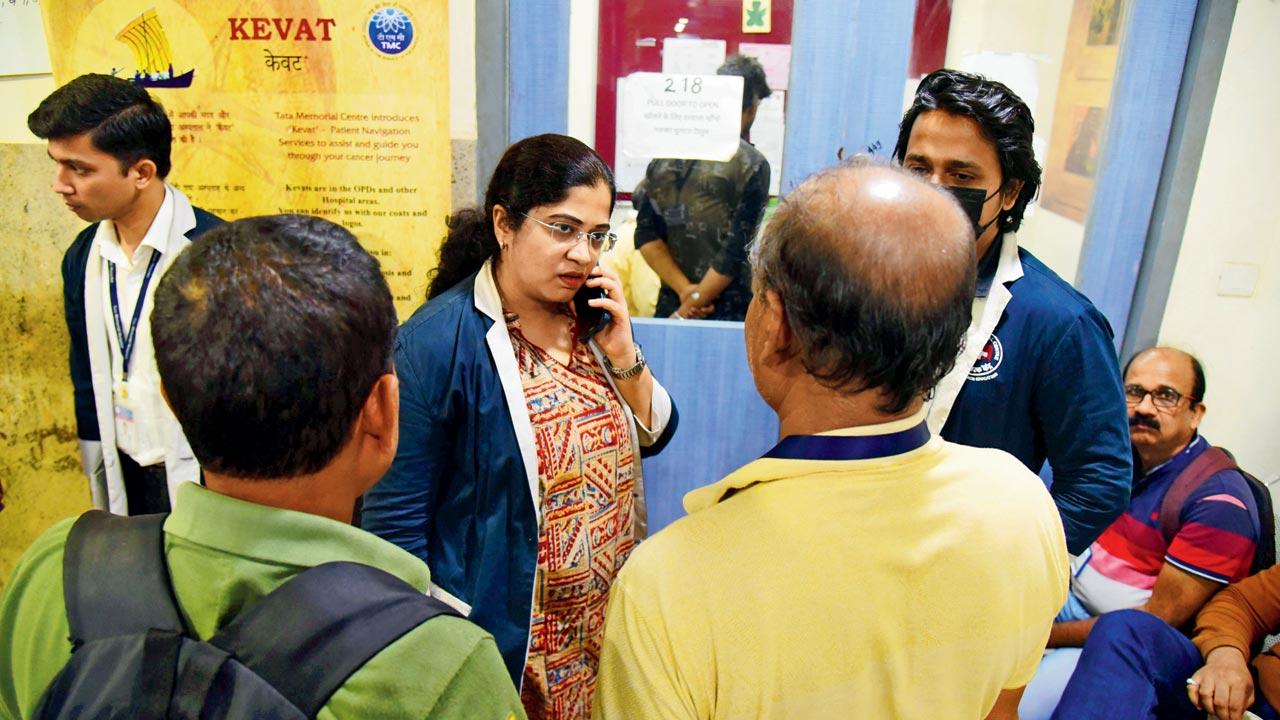 Kevats Apoorva Tiloda (extreme left) and Neha Desai dealing with crowds outside the counselling centre. Kevats also assist patients by coordinating between various departments at the hospital
Kevats Apoorva Tiloda (extreme left) and Neha Desai dealing with crowds outside the counselling centre. Kevats also assist patients by coordinating between various departments at the hospital
In some cases, especially when patients face a language barrier, Kevats accompany them to the consultation.
Desai and her colleague Snehal Mungekar are re-directing patients to specific departments. The post-consultation session also includes helping patients sort out their finances. “We inform them about government schemes they may be eligible for. We must know how they can apply and where,” adds Tiloda.
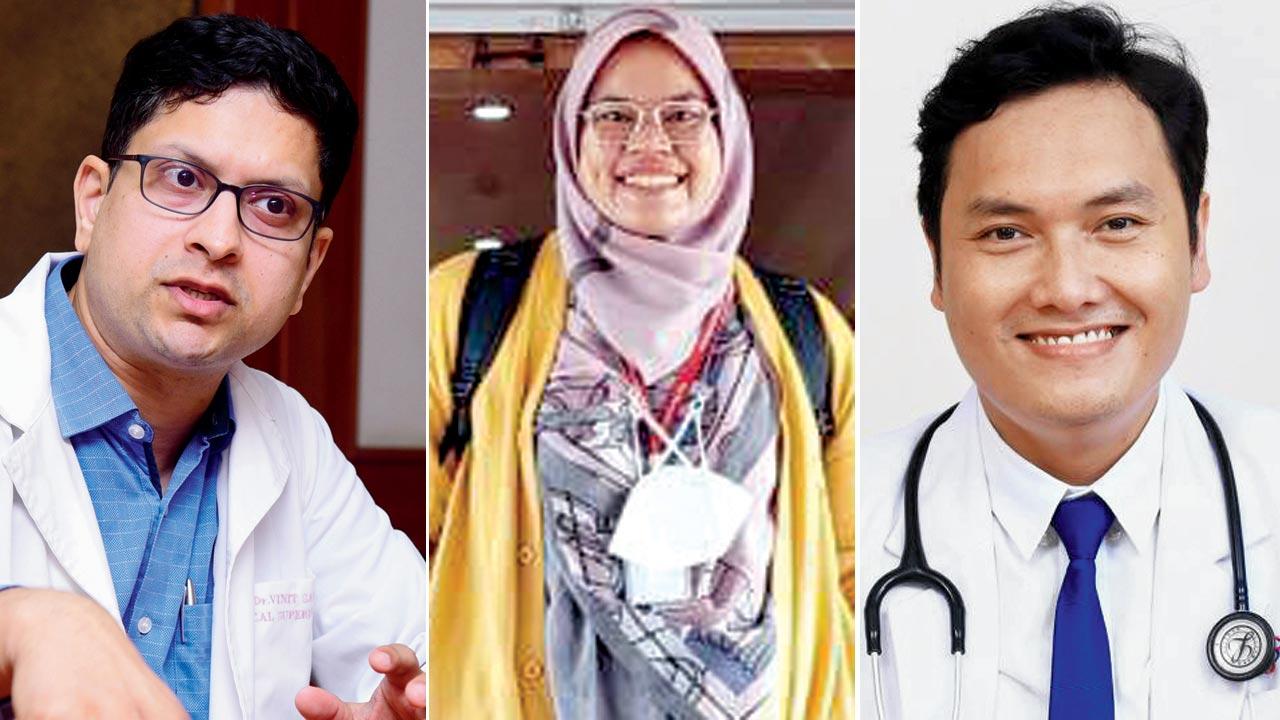 Vinit Samat, Yova Tri Yolanda and Dr Rikky Irawan Tulus Manuarang Purba
Vinit Samat, Yova Tri Yolanda and Dr Rikky Irawan Tulus Manuarang Purba
For those who must return for further investigation, Kevats help patients schedule appointments and counsel them on self-care before going in for a specific test. It’s imperative to be on an empty stomach before a PET scan or radiology procedure, for instance.
What if they don’t return? “We have a back office that calls them for updates and sounds us off on the progress of their course of treatment. This helps us understand whether there is resistance to take up the treatment or not,” says Mungekar. “Accordingly, we strategise; to keep pursuing them to meet us again so that we may explain the benefits of availing treatment.”
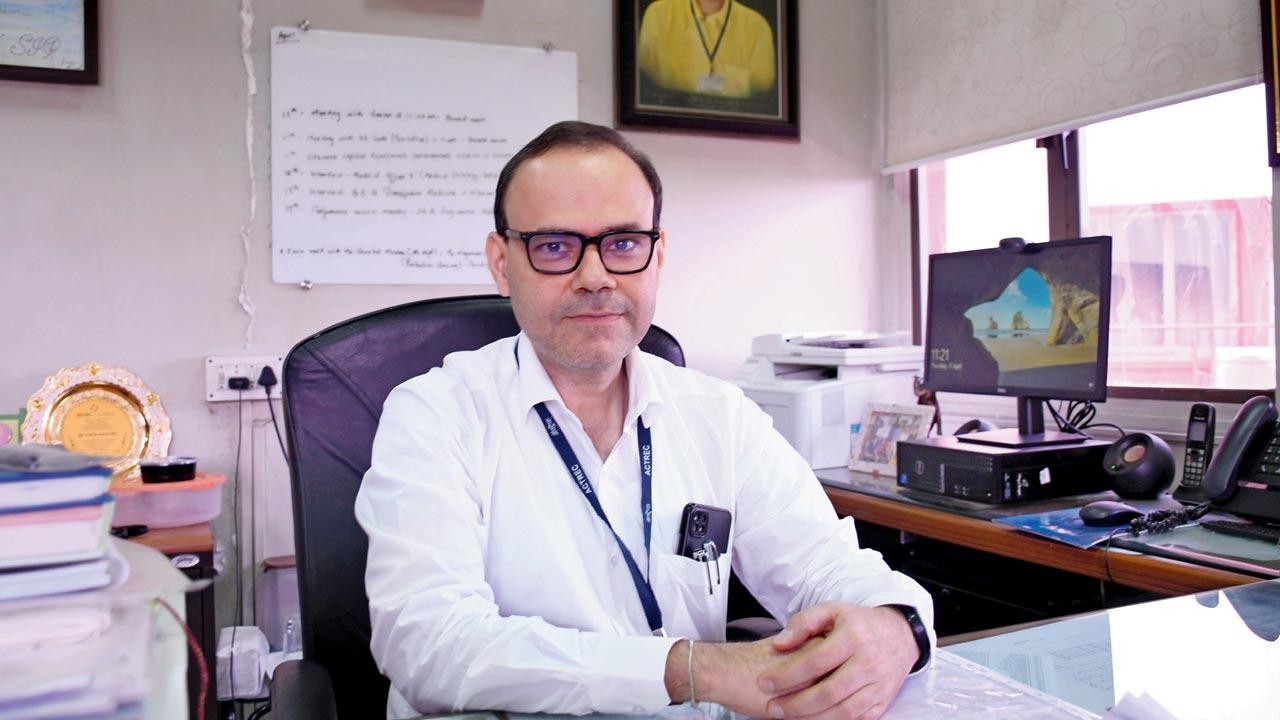 Dr Navin Khattry, deputy director of ACTREC Kharghar, feels that the presence of four Kevats and another four Kevat assistants has led to decrease in the number of drop out patients, mid-treatment
Dr Navin Khattry, deputy director of ACTREC Kharghar, feels that the presence of four Kevats and another four Kevat assistants has led to decrease in the number of drop out patients, mid-treatment
None of this is easy. And the grim nature of the job takes its toll. But they all watch out for a moment of hope. Desai recalls the time a patient from Odisha who she and Mungekar had helped returned after six months for a follow up. “She was carrying a pudi (small leaf parcel). It was ashirwaad, she said, from a mandir back home. She explained how it was special and she didn’t give it to just about anyone. You need this sometimes, a small indicator that you are doing some good in the world.”
In 2005, Kharghar’s sector 22 was considered secluded to visit after nightfall. The news that TMC had opened a cancer hospital here was considered impractical by Navi Mumbaikars. Today, ACTREC has grown from a 50-bed hospital to a 500-bedder and is positioned to grow to 900 beds in the next two years. A majority of ACTREC’s footfall comes from Ratnagiri and Raigad.
It’s where the most recent batch of the Kevat certificate course holders of 2023 have been deployed for eight months. The day mid-day visited, the city was celebrating Eid, a public holiday, and most patients had not turned up. It was a relatively easier day for Siddhant Shilwan, who was explaining paperwork in the counselling room attached to the blood cancer department. We were requested to mask up, because blood cancer patients are particularly susceptible to infection.
Shilwan, who has a background in Commerce, said he signed up for the Kevat programme after he had to turn caregiver for his ailing father throughout his second and third year of college. “I know how it is to be a caregiver, go from pillar to post asking for the right information. All the while, you try to deal with the thought of losing a parent,” he says. Shilwan’s father passed away soon after. “I see myself in every caregiver who comes here, and my father in every patient.”
His colleague Dilip Jaiswar works in the solid tumour department. He says the first time that he received affirmation for his decision to become patient navigator was when he was able to help a single mother with uterus cancer. “She had two minor children. She was alone, and was lost. Along with the fact that there was a language barrier, she was too overwhelmed to understand the line of treatment, one of which was that she needed blood immediately.” The blood bank had only one bottle for the group. “She was desperate and scared. She asked me for help. I donated a bottle of my own blood. I didn’t make much of it. But when she was leaving with her children, I realised what it meant to her. I am where I need to be,” says Jaiswar.
Ganesh Patil, who is posted in the in-patient department, has been helping a teenager with blood cancer for the last six months. “The child did not speak at all. He wouldn’t respond to the doctors or any of us. These cases are especially concerning as we need to see the patient show interest in recovery,” says Patil, a Bcom graduate who switched fields because he says he was missing the passion in his previous job. “After months of counselling, the child has begun to shake hands with us, greet us and say, good morning. This, for me, has been one of the most rewarding moments,” smiles Patil.
Mitra Keluarga is an Indonesia-based hospital operator. In an international collaboration, the Kevat programme, has been rechristened the Care and Patient Navigation (CPN) here with Dr Rikky Irawan Tulus Manuarang Purba, a general practitioner, helming it.
One of the key issues Purba was facing was the dropout rate of patients in the middle of their treatment. “It was close to 30 per cent. A large number of patients were either not responding or not turning up for treatment on the said day,” he tells mid-day over the phone from Jakarta . This was odd because unlike India, Indonesia offers national health insurance to all its citizens. “One of the tools we implemented is the WhatsApp hotline number. Patients send messages to the group and we respond during working hours or by the next day latest. This has made them feel that their queries are addressed swiftly and they don’t have to bother coming physically to the hospital for minor clarifications.” But he calls group or common counselling, an original Kevat technique, their biggest breakthrough. By placing patients with a common category of cancer together during counselling, they were able to find support and motivation. “When they saw other survivors, they returned for follow up treatment.” The dropout rate, Purba says, has come down five per cent in the last six months.
Yova Tri Yolanda, a clinical psychologist and graduate of the CPN/Kevat programme, is working as navigator in RS Sardjito Hospital, Jakarta. “At first, I wasn’t very sure how this programme would help me. What it does is make you understand that other than helping with documents, we use our skills to rid the patients of fear. It empowers them to take control of their life and decisions,” she says. “I was able to recently help a woman with uterus cancer take control of her treatment. She was paralysed by the fear of dying and her children being orphaned. I counseled her, convinced her that she would not know until she tried. It was satisfying when I saw her get discharged and go back home.”
Purba’s toughest challenge came a few months ago when a colleague, a nurse for over 20 years, was diagnosed with cervical cancer. “Although she was a nurse, it was difficult for her to accept that she had no treatment options. After rigorous counselling, we were able to have her understand that she could opt to stay home with her family and pass on with dignity. We lost her a few months ago,” says Purba. “It was my toughest task as CPN co-ordinator since the patient was a friend. “I’d ask her, what kind of farewell party do you want? A sad one or a happy goodbye?” Purba says that as navigator, he tries to see life and death as two sides of existence. “We know the value of life because of the presence of death.”
1.2L
No. of patients who visit Tata Memorial Hospital, Parel, annually
14L
The Indian Cancer Congress (ICC) in February 2024 stated that 14 lakh new cancer cases were registered nationally in the year 2019. The body estimates that this number will reach 20 lakh by 2020. Most cancers in India are primarily head and neck, gastrointestinal cancer, breast cancer and gynaecological cancers.
 Subscribe today by clicking the link and stay updated with the latest news!" Click here!
Subscribe today by clicking the link and stay updated with the latest news!" Click here!







